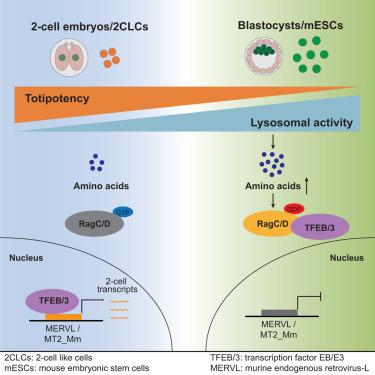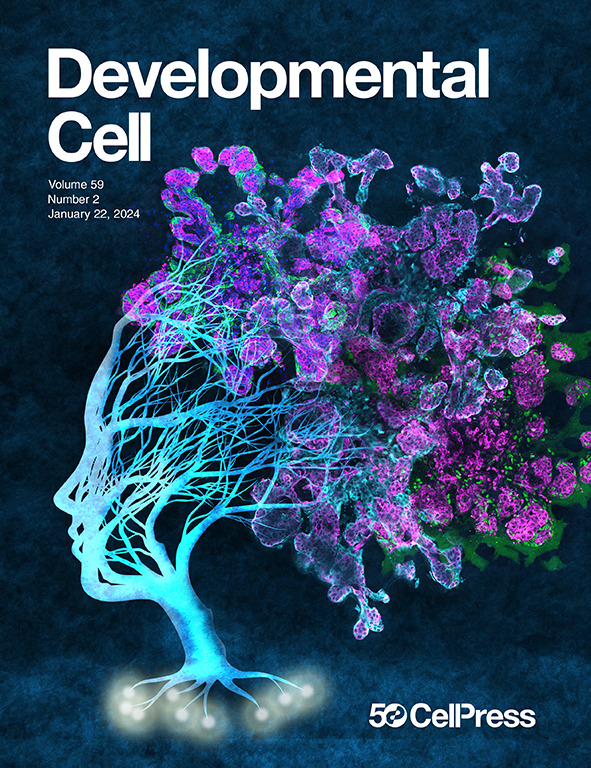Lysosomal catabolic activity promotes the exit of murine totipotent 2-cell state by silencing early-embryonic retrotransposons
IF 10.7
1区 生物学
Q1 CELL BIOLOGY
引用次数: 0
Abstract
During mouse preimplantation development, a subset of retrotransposons/genes are transiently expressed in the totipotent 2-cell (2C) embryos. These 2C transcripts rapidly shut down their expression beyond the 2C stage of embryos, promoting the embryo to exit from the 2C stage. However, the mechanisms regulating this shutdown remain unclear. Here, we identified that lysosomal catabolism played a role in the exit of the totipotent 2C state. Our results showed that the activation of embryonic lysosomal catabolism promoted the embryo to exit from the 2C stage and suppressed 2C transcript expression. Mechanistically, our results indicated that lysosomal catabolism suppressed 2C transcripts through replenishing cellular amino-acid levels, thereby inactivating transcriptional factors TFE3/TFEB and abolishing their transcriptional activation of 2C retrotransposons, MERVL (murine endogenous retrovirus-L)/MT2_Mm. Collectively, our study identified that lysosomal activity modulated the transcriptomic landscape and development in mouse embryos and identified an unanticipated layer of transcriptional control on early-embryonic retrotransposons from lysosomal signaling.

溶酶体分解代谢活动通过沉默早期胚胎逆转录载体促进小鼠脱离全能2细胞状态
在小鼠胚胎植入前的发育过程中,一部分反转座子/基因在全能的 2 细胞(2C)胚胎中短暂表达。这些 2C 转录本在胚胎 2C 阶段之后迅速关闭表达,促使胚胎退出 2C 阶段。然而,这种关闭的调控机制仍不清楚。在这里,我们发现溶酶体分解代谢在退出全能 2C 状态中发挥了作用。我们的结果表明,胚胎溶酶体分解代谢的激活会促进胚胎退出 2C 阶段,并抑制 2C 转录物的表达。从机理上讲,我们的研究结果表明溶酶体分解代谢通过补充细胞氨基酸水平抑制了2C转录本,从而使转录因子TFE3/TFEB失活,取消了它们对2C逆转录病毒MERVL(鼠内源性逆转录病毒-L)/MT2_Mm的转录激活。总之,我们的研究发现溶酶体活动调节了小鼠胚胎的转录组格局和发育,并发现了溶酶体信号转导对早期胚胎逆转录转座子的转录控制的一个意想不到的层次。
本文章由计算机程序翻译,如有差异,请以英文原文为准。
求助全文
约1分钟内获得全文
求助全文
来源期刊

Developmental cell
生物-发育生物学
CiteScore
18.90
自引率
1.70%
发文量
203
审稿时长
3-6 weeks
期刊介绍:
Developmental Cell, established in 2001, is a comprehensive journal that explores a wide range of topics in cell and developmental biology. Our publication encompasses work across various disciplines within biology, with a particular emphasis on investigating the intersections between cell biology, developmental biology, and other related fields. Our primary objective is to present research conducted through a cell biological perspective, addressing the essential mechanisms governing cell function, cellular interactions, and responses to the environment. Moreover, we focus on understanding the collective behavior of cells, culminating in the formation of tissues, organs, and whole organisms, while also investigating the consequences of any malfunctions in these intricate processes.
 求助内容:
求助内容: 应助结果提醒方式:
应助结果提醒方式:


